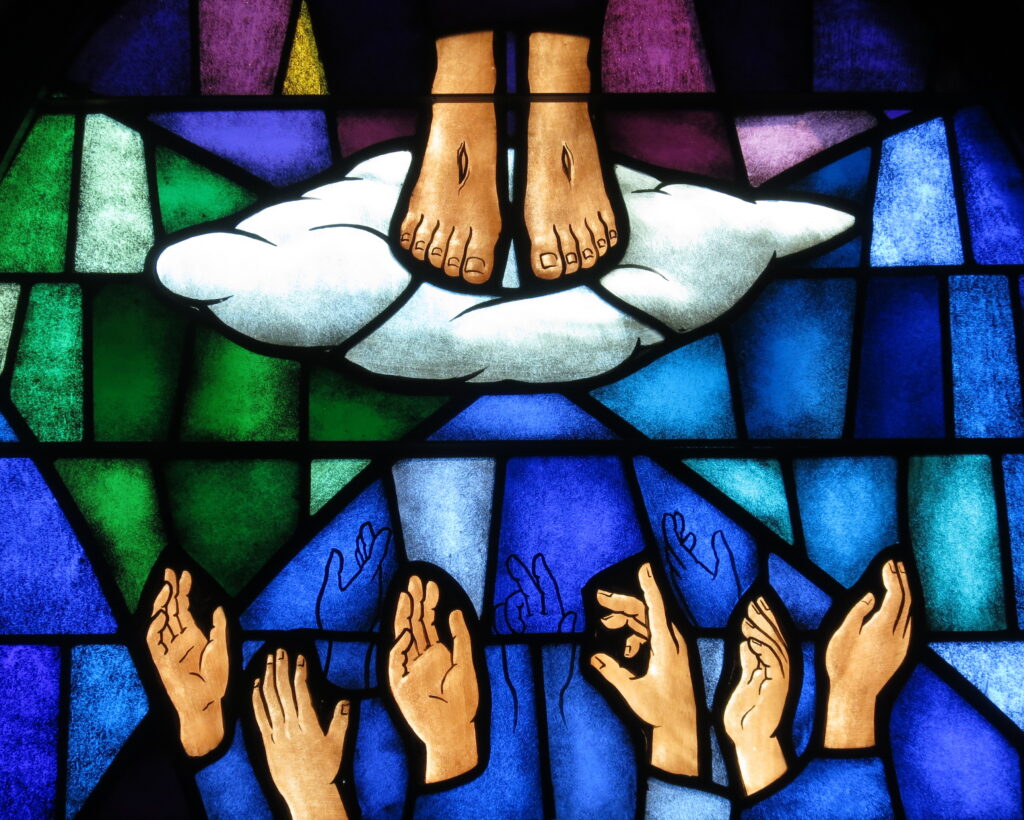Note: If you wish to receive, via e-mail, (1) my weekly newsletter or (2) daily copies of these posts, write to me at rrbates1951@gmail.com. Comments may also be sent to this address. I promise not to share your e-mail with anyone. To unsubscribe, write here as well.
Ascension Sunday
In celebrating the moment when Jesus ascended into heaven, we come to the next stage of that momentous journey that began with Christmas and Epiphany. If Epiphany represents the moment when people came to realize that divinity can be found within the world—incarnate in a human being—then Ascension shows Christ modeling what it means to step fully into that divinity. As Malcolm Guite puts it in “A Sonnet for Ascension Day,” “We saw him go and yet we were not parted/ He took us with him to the heart of things.”
There may be an echo here of lines from Wordworth’s Tintern Abbey, where the poet talks about the moment when, “with an eye made quiet by the power/ Of harmony, and the deep power of joy, /We see into the life of things.” For contrast purposes, poets writing about the Ascension always dwell upon what it is they are stepping beyond. For John Donne, who is always wrestling with his recalcitrant heart (“Batter my heart, three-personed God”), Ascension washes or burns away our “drossy clay.”
Salute the last, and everlasting day,
Joy at the uprising of this Sun, and Son,
Ye whose true tears, or tribulation
Have purely wash’d, or burnt your drossy clay.
In this, the final lyric in Donne’s seven-sonnet sequence known as “The Crown,” Donne sees Christ paving the way to heaven. “Bright Torch, which shinest, that I the way may see!” he writes.
In his own Ascension poem Henry Vaughan too talks about earthly clay ascending “more quick than light.” He also uses a clothing analogy. “Who will ascend, must be undrest,” he asserts before noting how we have soiled the clothes we were given:
But since he
That brightness soiled,
His garments be
All dark and spoiled,
And here are left as nothing worth,
Till the Refiner’s fire breaks forth.
“He,” in this instance, is Adam, who in his naked innocence was “intimate with Heav’n”:
Man of old
Within the line
Of Eden could
Like the Sun shine
All naked, innocent and bright,
And intimate with Heav’n, as light
With Christ’s arrival and then with the Ascension, the Fall doesn’t get the last word as “stained man” is made “more white than snow”:
Then comes he!
Whose mighty light
Made his clothes be
Like Heav’n, all bright;
The Fuller, whose pure blood did flow
To make stained man more white than snow.
For his part, Malcolm Guite talks about how “the heart that broke for all the broken-hearted” is now “whole and Heaven-centered.” This Jesus heart “sings in the strength that rises out of weakness,/ Sings through the clouds that veil him from our sight.”
The result is that we, as witnesses, can “sing the waning darkness into light.” Jesus’s light is in us, just as our light is in him, with the barriers between heaven and earth coming down. As Guite explains,
The mystery of this feast is the paradox whereby in one sense Christ “leaves” us and is taken away into Heaven, but in another sense he is given to us and to the world in a new and more universal way. He is no longer located only in one physical space to the exclusion of all others. He is in the Heaven which is at the heart of all things now and is universally accessible to all who call upon Him.
And further:
His humanity is taken into heaven so our humanity belongs there too, and is in a sense already there with him.” For you have died”, says St. Paul, “and your life is hidden with Christ in God.
Here’s Guite’s sonnet:
A Sonnet for Ascension Day
We saw his light break through the cloud of glory
Whilst we were rooted still in time and place
As earth became a part of Heaven’s story
And heaven opened to his human face.
We saw him go and yet we were not parted
He took us with him to the heart of things
The heart that broke for all the broken-hearted
Is whole and Heaven-centered now, and sings,
Sings in the strength that rises out of weakness,
Sings through the clouds that veil him from our sight,
Whilst we our selves become his clouds of witness
And sing the waning darkness into light,
His light in us, and ours in him concealed,
Which all creation waits to see revealed.
As I’ve been noting recently, John Gatta in Green Gospel: Foundations of Ecotheology observes that “all creation” involves far more than humans. When we open ourselves to God’s bigness, we develop in ways that are beyond human imagining.


